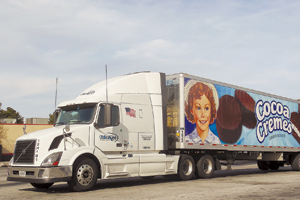McKee Foods Receives HOS Exemption

This story appears in the April 13 print edition of Transport Topics.
The Federal Motor Carrier Safety Administration has granted an hours-of-service exemption to team drivers working for McKee Foods Transportation, allowing them flexibility in their sleeper berth schedules.
The one-year exemption will allow the carrier’s team drivers engaged in delivery and backhaul operations to take the equivalent of 10 consecutive hours off duty by splitting sleeper berth time into two periods totaling 10 hours, provided neither period is less than three hours.
FMCSA said it granted the exemption because it believes McKee “will likely achieve a level of safety that is equivalent to, or greater than, the level of safety achieved without the exemption.”
The agency also granted two other recent HOS exemptions, one to the nation’s ready-mixed concrete haulers and the other to lumber transporters in Oregon. In both cases, the agency exempted drivers from a requirement that they take a 30-minute rest break within the first eight hours of driving.
McKee has about 650 drivers who deliver the company’s fresh-baked products to its customers using more than 300 tractor-trailer combinations. The team drivers travel in double-berth tractors, the company said.
McKee Foods, based in Collegedale, Tennessee, is the maker of the Little Debbie brand, Drake’s and Sunbelt granola and cereal.
The carrier ranks No. 92 on the Transport Topics Top 100 list of the largest private carriers in the United States, Canada and Mexico.
In its January 2014 exemption request, McKee said it needed the exemption to allow its team drivers, who drive and offload products to the company’s customers, to be both productive and well-rested.
“Having additional flexibility to switch with a partner allows each driver to take advantage of shorter time periods when they may feel fatigued even though they have available log time to drive,” the company said in its exemption application.
American Trucking Associations said in written comments in 2014 that the McKee exemption is an important one and will give FMCSA an excellent opportunity “to observe the safety, and perhaps health, benefits of allowing additional flexibility into sleeper berth utilization.”
“At the heart of MFT’s exemption application is an intuitive paradigm: Drivers should rest when sleepy and drive when alert,” ATA said.
ATA said it supported the exemption because McKee has “exemplary” safety controls and an “exceptional safety culture,” and current FMCSA sleeper berth rules represent an “excessive regulatory burden and a degradation of safety,” and research supports the need for more flexible sleeper berth rules.
However, the Advocates for Highway and Auto Safety said the exemption application failed to carefully review the regulation to determine whether there are any practical alternatives available that would allow the carrier to conduct its operations.
“The fact is that the sleeper berth provision in its entirety has been questionable and that any further reductions to the minimum sleep period requirement of eight hours will leave drivers with even less of an opportunity to obtain necessary restorative sleep,” the group said in written comments.

